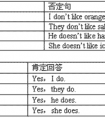句型转换.1.Didyoudecideongoingonafieldtrip?(改为同义句)Didyoudecide________afieldtrip?2.WeenjoyedourselvesinthezooofBeijing.(改为同义句)We________inthezooo-八年级英语
2) Let us/me...后的反意疑问句用will you或won't you。例如:
Let me have a try, will you/won't you? 让我试一试,行吗?
2. 感叹句。感叹句后加反意疑问句时,其反意疑问句需用be的一般现在时态的否定形式。 例如:
What fine weather, isn't it? 多好的天气啊,是吧?
3. 当陈述部分谓语动词是need, dare, used to,且这些词被用作实义动词时,其反意疑问 句需用do的适当形式。例如:
He needs help, doesn't he? 他需要帮助,是吗?
4. 陈述部分主、谓语是I am...时,反意疑问句用aren't I 或am't I ,而不是am not I (可 用a m I not)。例如:
I'm working now, am't I? 我在工作,是吗?
5. 陈述部分的主语是everything, nothing, anything或something 时,反意疑问句的主语应用代词it。例如:
Something is wrong with my radio, isn't it? 我的收音机出毛病了,是吧?
6. 陈述部分的主语是 everybody, everyone, anybody, anyone, somebody, someone, nobody, no one, none, neither 时, 其反意疑问句的主语需用复数代词they。 例如:
Everyone is here, aren't they? 大家都到了,是吗?
No one knows about it, do they? 没有人知道这件事,对吗?
7. 陈述部分的主语是指示代词this或that时,反意疑问句的主语用it,当陈述部分的主语是指示代词these或those时,其反意疑问句的主语用they。 例如:
This is a plane, isn't it? 这是一架飞机,是吗?
These are grapes,aren't they? 这些是葡萄,是吗?
8. 陈述部分的主语是不定代词one时,反意疑问句的主语可以用one,也可用you(美式英语用he)。例如:
One should be ready to help others, shouldn't one? 每个人都应该乐于助人,是吧?
9. 当陈述部分含有以下这些含有否定意义的词时:few, little, seldom,hardly, never, not, no, no one, nobody, nothing, none, neither等,其反意疑问句需用肯定结构。 例如:
He is never late for school, is he? 他上学从不迟到,是吗?
10. 当陈述部分所含的否定词是通过加前缀或后缀构成的,其后的反意疑问句依然用否定结构。例如:
It is unfair, isn't it? 这不公平,是吧?
11.含有否定含义的词在陈述部分作动词的宾语时,其反意疑问句用肯定结构,也可以用否定结构。例如:
You got nothing from him, did you? 你从他那儿什么也没得到,是吗?
12. 当陈述部分主语是从句、不定式(短语)、动词-ing形式时,反意疑问句的主语应该用it。 例如:
What you need is more important, isn't it?你需要的东西更重要,是吧?
13. 当陈述部分含I think (believe, suppose...)that... 结构时,其反意疑问句须与从句的主、谓语保持一致,注意主句的主语必须是第一人称。例如:
I don't think he will come, will he? 我认为他不会来,对吗?
14.have(has)不是表示“有”的意思,并在句中做谓语时,其反意疑问句的助动词要用do, does, did。例如:
They had a meeting just now,didn't they? 他们刚才开了个会,是吗?
15. 陈述部分有have to 时,其反意疑问句要用助动词的否定形式。例如:
You have to water the vegetables every day, don't you?你每天都要浇菜,对吧?
16. 陈述部分是there be句型时,其反意疑问句中要用there。例如:
There was a hospital here, wasn't there? 过去这儿有家医院,是吗?
17. 陈述部分有had better时,反意疑问句中要用hadn't。 例如:
We had better go to school at once, hadn't we? 我们现在最好马上去上学,好吗?
18. 当陈述部分含有情态动词must时,我们便要分析一下must的含义。如果must 作“一定;要;必须”讲,反意疑问句须用mustn't或needn't;
而当must作推测意义“一定 是;必定”讲时,反意疑问句则需根据must后的动词原形选用相应的形式。例如:
He must work hard at physics, mustn't he? 他必须努力学物理,是吧?
Tom must be at home,isn't he? 汤姆一定在家,是吧?
考点名称:固定搭配
- 固定搭配:
英语中的固定搭配主要是指英语中的习惯用法,如有固定用法的一些动词短语、介词短语、名词词组及形容词词组。
例如:
take part in (参加)
by accident (偶然地)
lucky dog (幸运儿)
be interested in (对…感兴趣) 初中英语常见固定搭配:
(一)加-ing
enjoy / like doing sth 喜欢做----
spend....(in) doing sth 在做---花费---
try doing 试着做------
be busy doing sth 忙于做------
finish doing sth 完成做----
look forward to + doing sth 期待做----(现在进行时)
be doing 正在做---
Thank you for (doing) sth 为了--感谢你(二)加-to
decide to do sth 决定去做-----
ask (sb)to do 要求(某人)去做----
It’s+adj +to do sth . 做---(怎么样)
would like / want to do 想要做-----
It takes sb sometime to do sth在做----花费----
(三)加原形
let / make sb do sth 让某人做某事
be going to / will do sth (一般将来时态)
(四)加-to 或-ing意思不同
forget doing 忘记做过了-----(已做)
forget to do 忘记去做------(还没做)
remember doing记得做过了-----(已做)
remember to do记得去做------(还没做)
(五)加-to 或-ing意思相同
begin / start to do sth = begin / start doing sth开始做------
(六)
A)动词+ 介词
agree with同意....的意见(想法);符合
help ... with ...帮助(某人)做(某事) listen to听...
..get to到达....
fall off (从......)掉下base on以....(为)根据
knock at /on敲(门、窗)
laugh at嘲笑
learn.. from 向...学习
live on继续存在;靠...生活
look after照顾,照看look at看;观看
look for寻找
look like看起来像
pay for (sth.)付钱;支付
point at指示;指向
point to指向....prefer to ...宁愿(选择);更喜欢
quarrel with (和某人)吵架
regard...as ...把....当作....;当作
stop...from阻止.....做.....
talk about说话;谈话;谈论
talk with与......交谈think about考虑
think of认为;想起
B)动词+ 副词
ask for请求;询问
carry on坚持下去;继续下去
cut down砍倒
clean up清除;收拾干净
come down下来;落
come along来;随同
come in进来
come on来吧;跟着来;赶快
come over过来;顺便来访
- 最新内容
- 相关内容
- 网友推荐
- 图文推荐
| [家长教育] 孩子为什么会和父母感情疏离? (2019-07-14) |
| [教师分享] 给远方姐姐的一封信 (2018-11-07) |
| [教师分享] 伸缩门 (2018-11-07) |
| [教师分享] 回家乡 (2018-11-07) |
| [教师分享] 是风味也是人间 (2018-11-07) |
| [教师分享] 一句格言的启示 (2018-11-07) |
| [教师分享] 无规矩不成方圆 (2018-11-07) |
| [教师分享] 第十届全国教育名家论坛有感(二) (2018-11-07) |
| [教师分享] 贪玩的小狗 (2018-11-07) |
| [教师分享] 未命名文章 (2018-11-07) |


![Sunday is my birthday. I would like _____ a birthday party, would you _____to my party? [ ]A. have; come B. to have; to come C. have; to come D. to have-七年级英语](http://www.00-edu.com/d/file/ks/4/2/budingshi/2020-01-08/smalla85122db0c71d7fb6ae58187be7f1fd11578430330.png)

![Why areyou here? You are supposed ______ in the classroom now. [ ] A. to studyB. to be studiedC. studying D. to be studying -九年级英语](http://www.00-edu.com/d/file/ks/4/2/budingshi/2020-01-08/small6dee02daa62cac1c71853ac804ab4fbd1578422460.png)
![She is very poor. Little food _____ and no room _____! [ ]A. to eat, to live B. to eat, to live in C. eating, living -八年级英语](http://www.00-edu.com/d/file/ks/4/2/budingshi/2020-01-09/small17b77c2697a3ef8f1461d0d14b016ee51578585185.png)
